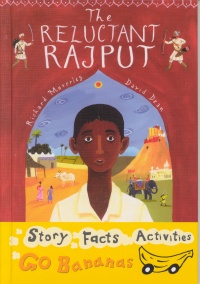| ________________
CM . . .
. Volume XII Number 16 . . . .April 14, 2006
excerpt:
Bhupinder, who lives in a small village in Andhra Pradesh, India, with no electricity or running water, longs for excitement and eagerly anticipates his teacher's stories of the big cities not too far away. From his teacher, he learns that India has incredible cities with huge buildings and lots of cars. His teacher next tells the students about ancient warriors, called the Rajputs, who fight to defend their forts and palaces at all costs. This story ignites Bhupinder’s imagination, and he wishes he had a more exciting life. On Bhupinder’s way home, instead of playing cricket with his friends, he and they all imagine they are Rajput warriors, and they battle their evil enemies, the Moghuls. Once home, Bhupinder falls asleep, and, when he "wakes up" (actually a dream), he finds himself inside one of the most magnificent palaces in India, the Meherangarh. As he explores, he discovers Moghuls attacking the walls. He alerts the Rajputs who rush to battle, but he also discovers Moghuls breaching one of the palace walls, and he is the only one around to defend it. Bhupinder battles long and hard and eventually, with the help of some late-arriving Rajputs, vanquishes the foes. The Rajputs crowd around, wanting to shake his hand and give him a large reward, but the only thing Bhupinder wishes for is a return to his life with his family (even if it is boring). He runs away but feels he is being pursued by somebody, or something that is going to get him. His fears are allayed when he wakes up from this realistic dream to find the family pet, Nandi the cow, licking him. This is another of the “Go Bananas” early chapter books which are meant to bridge the gap between picture and chapter books. The length of the story is adequate, and the illustrations are suitable to the story and are appropriate for the age range but do not overdo the blood and gore referred to in the story. The illustrator has depicted Bhupinder's community well, and a lot of information can be grasped from the art. As the story does a fantastic job of identifying aspects of the daily life of a boy in present day rural India, readers can then compare and contrast what they read with what they experience in their own lives. The weather systems, the heat, the landscape are well described and illustrated. When I read this book to a sample grade three class, they had a difficult time understanding that a person could live so poorly in the countryside when there were wealthy cities not too far away. The sample class liked the story and thought the ending was funny. The class was in the target age range, but there did not seem to be the interest generated in this book as there was with another “Go Bananas” book I shared with them. I was a little disappointed in the story and thought that there really was a lot more potential in this book than was realized. The story has the makings of a high interest book with a lot of action, but it falls short on the delivery. The author faces a challenge in trying to portray the daily life in modern India with the excitement of Bhupinder's dream and the history of the Rajputs. Unfortunately, this book feels like an advanced version of the "I woke up, and it was all a dream" ending. I believe this story makes for a better read aloud as it does offer some very good connections to social studies lessons, such as comparing and contrasting daily lives. As with other “Go Bananas” books, there are facts about daily life in rural India plus the nice addition of two recipes. Recommended with reservations. John Dryden is a teacher librarian at Khowhemun Elementary School in Duncan, B.C.
To comment
on this title or this review, send mail to cm@umanitoba.ca.
Copyright © the Manitoba Library Association. Reproduction for personal
use is permitted only if this copyright notice is maintained. Any
other reproduction is prohibited without permission.
NEXT REVIEW |
TABLE OF CONTENTS FOR THIS ISSUE
- April 14, 2006.
AUTHORS |
TITLES |
MEDIA REVIEWS |
PROFILES |
BACK ISSUES |
SEARCH |
CMARCHIVE |
HOME |
